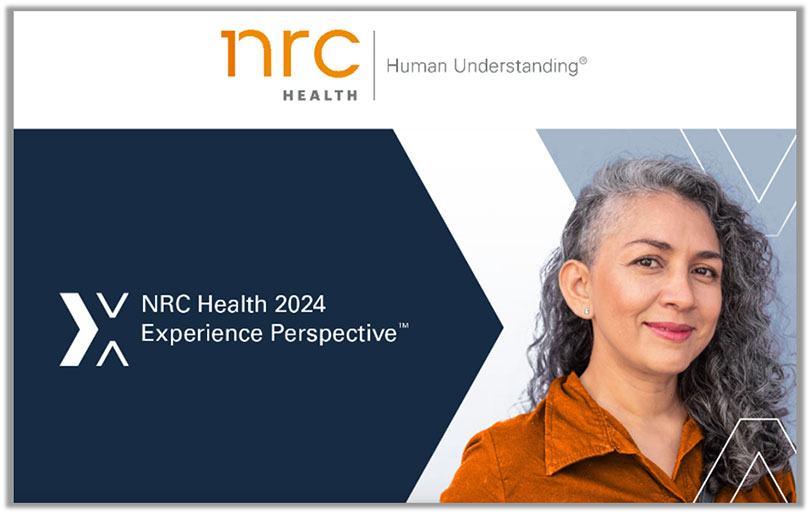
If you missed the NRC Health 2024 Experience Perspective webinar last week or haven’t had a chance to leaf through the 50-plus page report, below are six key takeaways to help keep you conversationally current at your next healthcare marketing networking event.
- Adopt the “One Big Dot” approach. By transcending silos that artificially separate experience, quality, safety, equity and brand, this approach can re-energize improvement efforts by fostering alignment across domains. Although they may be measured separately, the sum of these care experience parts interconnectedly shapes brand perception.
- A three-dimensional view of safety is key. It’s essential that health organizations give equal attention to physical safety, emotional safety and a safe environment of care. Consumers believe doctors/care teams focus most on physical safety, while hospitals/health systems focus most on providing a safe environment. As people expect physical and care environment safety, the emotional safety provided through a Human Understanding approach is the differentiator.
- Human Understanding is the differentiator. As people expect physical and care environment safety, the emotional safety provided through a Human Understanding perspective is where brands can stand out. It boils down to three behaviors: Connect with me, Listen to me, Partner with me. And one question: Did everyone treat you as a unique person? NRC’s 2023 Market Insights Study indicated only 38% of people who were patients in the prior year reported yes. As Human Understanding is the best predictor of likelihood-to-recommend, there is large improvement opportunity here, and organizations who embrace a Human Understanding approach experience proven gains. Since positive impressions tend to diffuse over time, a commitment to Human Understanding doesn’t stop when patients leave the care facility.
- Experience success requires focus, clarity and accountability. As care providers sometimes view Experience as “one more thing,” it’s difficult to sustain Experience success without a strong Experience Strategy Framework from the top down. Interestingly, in an NRC tally regarding CEO roles as experience champions, there was a glaring disconnect in experience leader vs. CEO perceptions. While only 48% of experience leaders viewed their CEO as proactive (passionate, energizing and visible experience champions), a whopping 100% of CEOs viewed themselves in the champion category.
- “Detractors are healthcare’s misunderstood stakeholder,” claims Gregory Makoul, PhD, MS, Chief Transformation Officer, NRC Health. By definition, detractors are highly dissatisfied customers who may harm a company’s reputation by sharing negative experiences. They are typically younger and female. The good news is NRC has found detractors are, in fact, forgiving, which reinforces understanding what makes them tick. The goal being to convert them to promoters, those desirables on the other end of the spectrum. Behaviors associated with conversion are: Care providers listened; Got enough information regarding treatment; Trust provider with care.
- Emerging trends include increased retail clinic usage (from 23.4% to 33.9% in 2023); increased preference for health systems (from 64.9% in 2019 to 67.4% in 2023); increased net promoter score for healthcare facilities (from 75.3% in 2019 to 78.9% in 2023); increased loyalty to hospital/health system (from 61% in 2019 to 66.1% in 2023). In addition, an inviting digital front door is critical, as people are increasingly accessing hospitals and health information via mobile devices (from 44.9% in 2019 to 59.1% in 2023) and hospital websites (from 79.4% in 2019 to 83.8% in 2023).
NRC Health espouses that Human Understanding is the line of continuity that runs through every aspect of experience for all involved. Because healthcare is human care.























